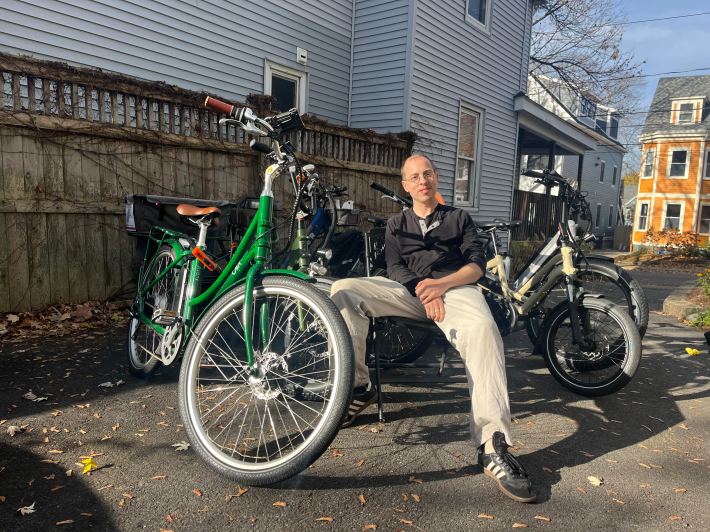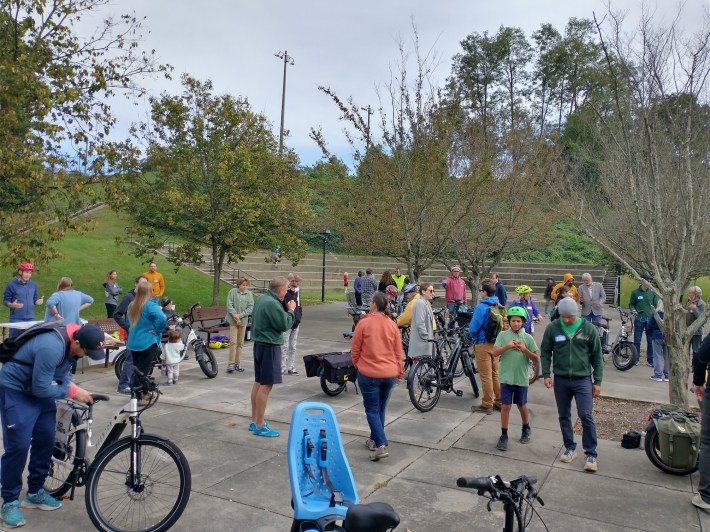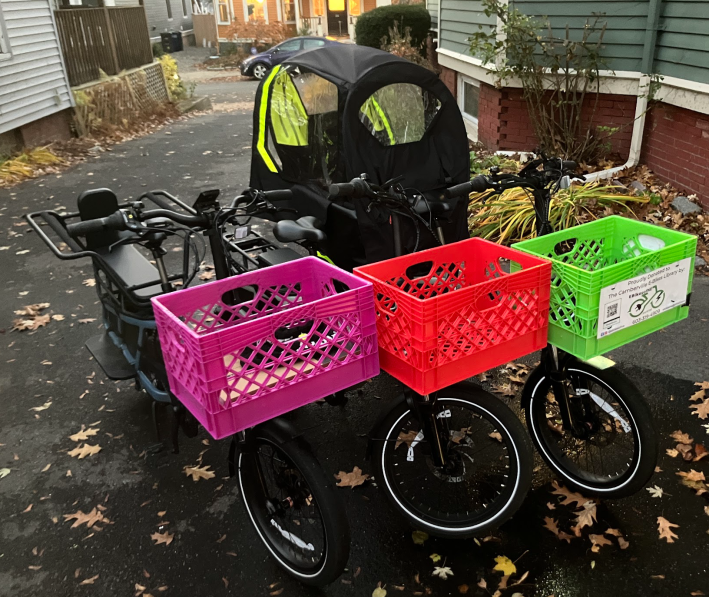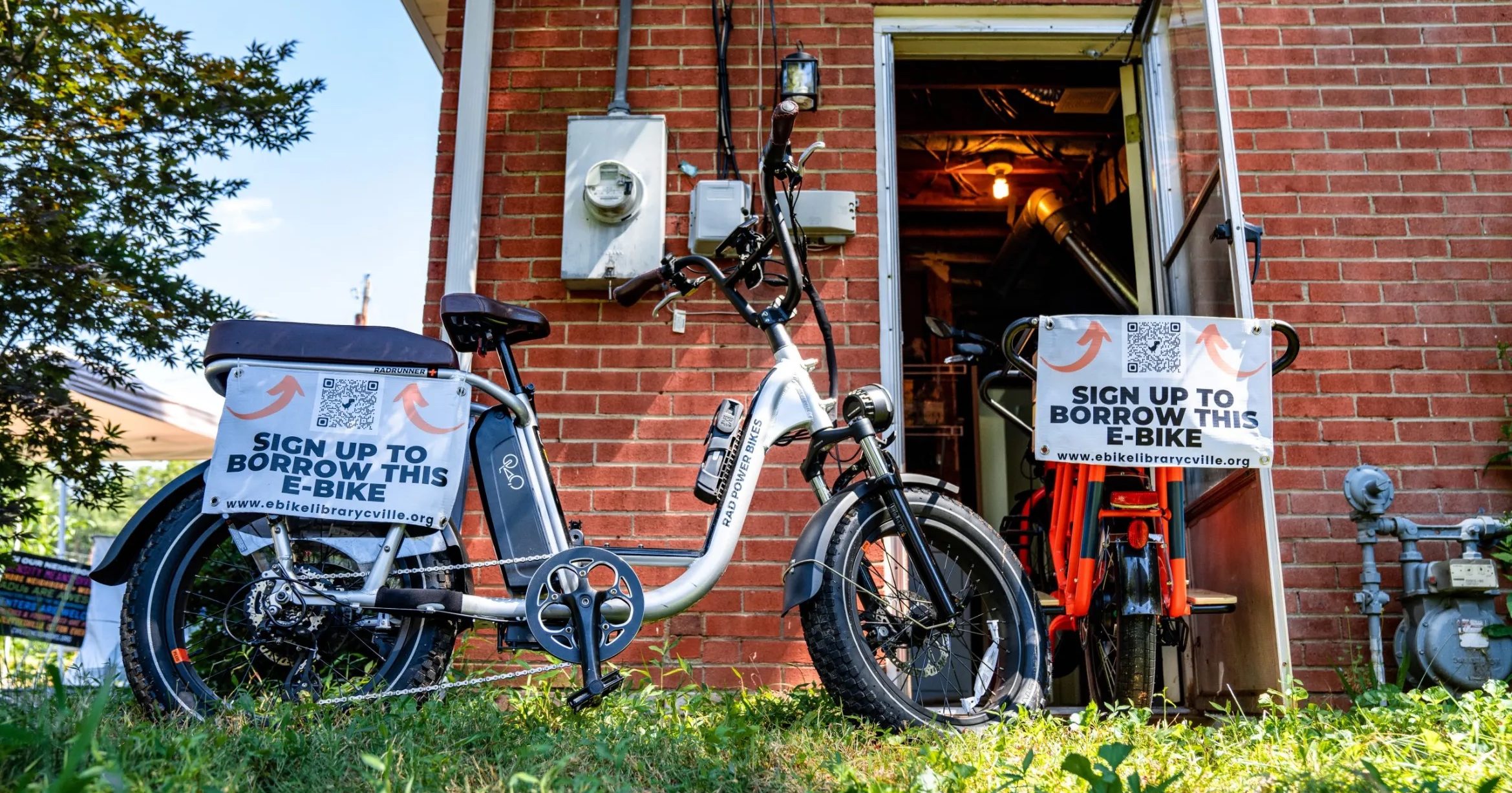Christopher Schmidt didn't set out to become a "bike therapist" when he started lending e-bikes to his neighbors out of his Cambridge backyard for a week a time. But soon, he found himself spending nearly as much time helping riders navigate the emotional challenges of getting on two wheels as he did loaning out chargers and helmets.
"Their questions aren't just, ‘How does the bike work?’" he added. "They're about, ‘What do you think about e-bikes? What do you think about e-bike fires?' … I think [that's] a lot of the reason that people come to the e-bike library, in place of a bike store."
Schmidt is one of a growing number of American who have launched a free, grassroots "e-bike library," which he created to help "more people understand whether an e-bike is right for them, and help them find the one that will work right for them if so." The model provides a neighborly alternative to sometimes-costly traditional bike share rentals that only offer limited models, too-short test-rides at bike shops that can be alienating for some shoppers, and even to traditional libraries that allow patrons to check out bikes alongside books — but may not have an expert on hand to talk about how and where to ride in a neighborhood they know intimately.

That personal touch, e-bike librarians argue, can give riders the confidence they need to buy an e-bike of their own — and eventually, trade it for many or even all of their car trips. The library organizers we spoke to for this story say they've made hundreds of loans with little more than word-of-mouth and online promotion, and they estimate that between one-third and half of their patrons have gotten their own ride in as little as two months.
"[It can be] a really risky and challenging prospect to get your own e-bike," said Josh Carp, founder of the Charlottesville E-Bike Lending Library in Virginia. "Even the cheaper ones aren't all that cheap. A lot of them are purchased online. And a lot of people will see an article about an e-bike, and think, 'That's cool, but I can't really afford to spend $1,000, $2,000 on this thing — especially when maybe it doesn't work out, and it'll just end up in my garage where I never use it again."
Carp argues e-bike libraries can convert long-term riders by giving them the opportunity to see firsthand how e-bikes fit into their daily lives — and a peer help them process what that shift might actually look like.
Over the course of several weeks, a librarian might coach a patron on the basics of cargo bike storage in a studio apartment, or how to charge a battery safely if there’s no outlet in the garage; he might share his own experiences biking with kids, and offer other parents detailed advice before he loans them a child seat to go with their long-tail; he can help them game-plan a pedal-assisted grocery run and loan (or even gift) them a set of panniers; they might trade stories about scary run-ins with drivers, and talk through the anxiety of getting back in the saddle.
And above all, Carp says he stresses safe riding and safe routes, based in part on his own lived experience on neighborhood roads.
“We talk about intersections a lot; we talk about right turns on red and how not to get doored,” he adds. “I have some written materials people have to acknowledge they've read. … I'm a parent, so I will give people sort of a dad speech about how you need to ride safely.”

Carp acknowledges that simply starting an e-bike library isn’t always easy, never mind providing such a high level of personal attention.
Though Camberville and Charlottesville both began with only a handful of vehicles — Carp’s first library bike was bought with donations from friends who believed in his idea, and Schmidt’s with $4,500 in Rad Power Bikes referral credits he amassed during a particularly good sale — they’ve since been donated fleets of eight and 12 vehicles, respectively, which they maintain and loan out on the edges of full-time jobs. They’ve had to navigate the challenges of guarding against bike theft — tracking tags, tutorials on how to safely lock up in public, and simple neighborly kindness all help — as well as minimizing liability by incorporating as 501(c)3s or partnering with other nonprofits willing to include them under their insurance policies. They've also had to tackle community fundraising for occasional bike maintenance, which thankfully, hasn't been too challenging; many riders happily leave a tip in thanks for a ride.
So far, neither Carp nor Schmidt has fundraised to pay themselves a salary to run their respectively libraries — one of the many benefits of keeping operations informal and community-led, they say, even as they recognize that it’s not an option for everyone. Carp has a flexible, work-from-home schedule that makes it relatively easy to handle the day-to-day wrangling of Google form check-out requests and meeting patrons midday, but he recognizes that not everyone has that bandwidth to sacrifice their time, energy and garages to a volunteer gig.
“I think the cost of any kind of project of this scale is the risk of burnout,” he adds. “[But] my hope is that maybe, after five years, every third person in the city will have an e-bike, so everyone will have a neighbor with an e-bike to lend to them. I don't think it needs to be an indefinite project.”

Schmidt, for his part, has created a resource guide to make it easier for the e-bike librarians of tomorrow get started. Though Carp cautions that once you do, e-bikes are so amazing that the project can snowball quickly.
“You can do it with just one bike and make a real impact on the community,” he adds. “And in my experience, once you start with one, people will want to help you get more. If anything, the hardest thing is to impose some limits and stop growing.”






